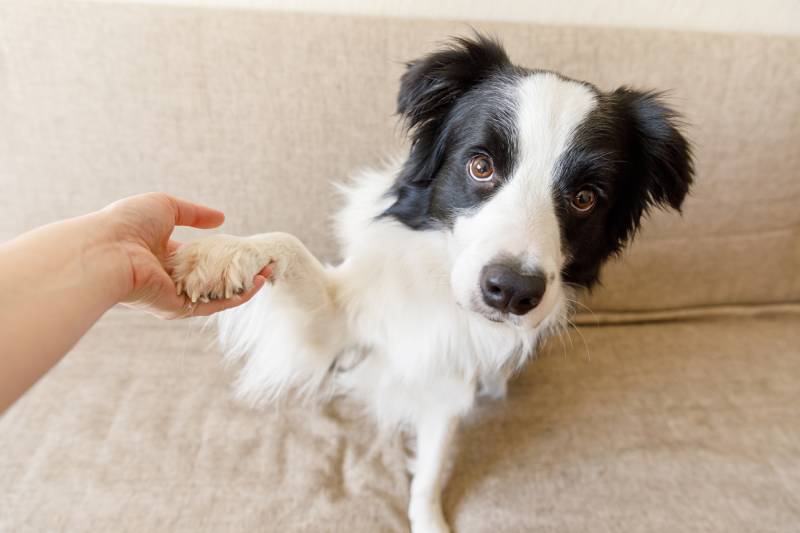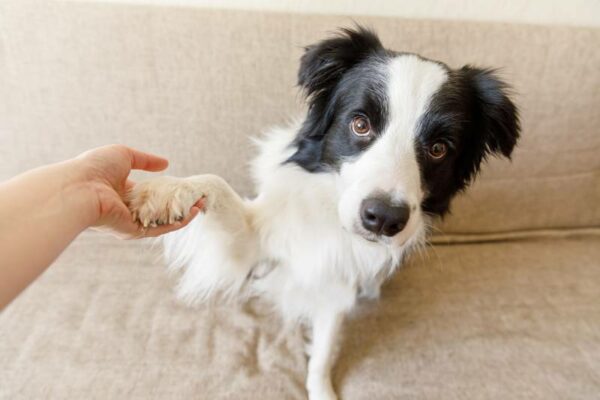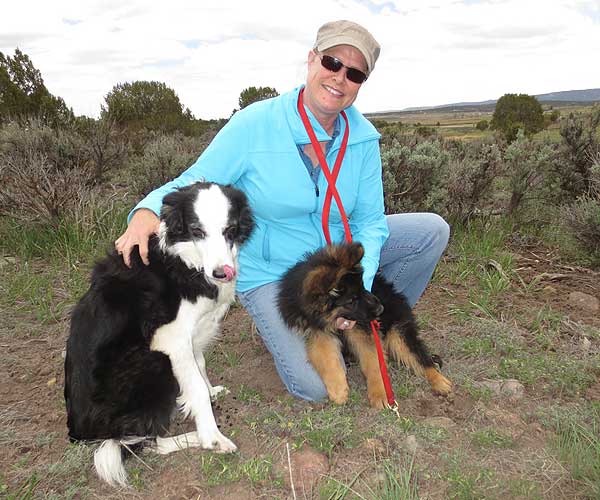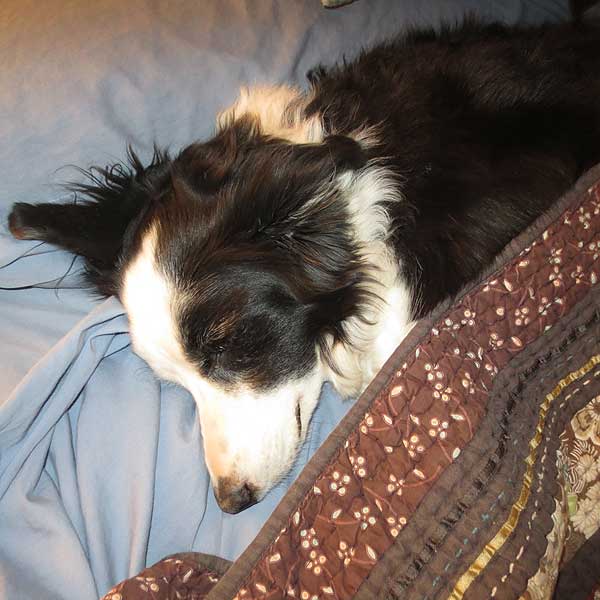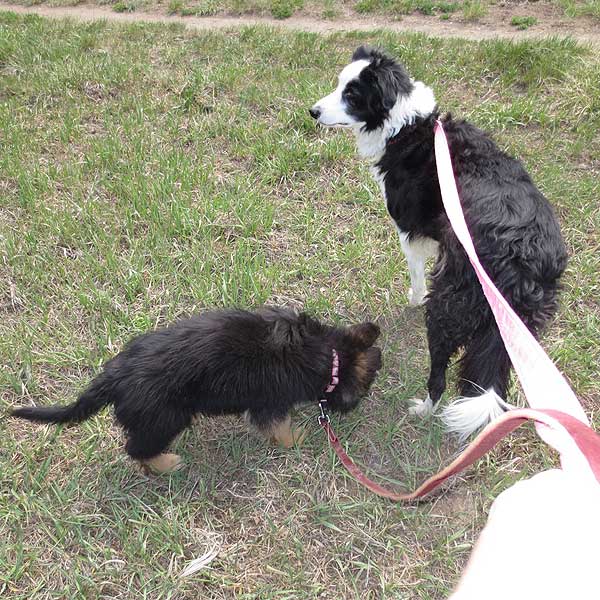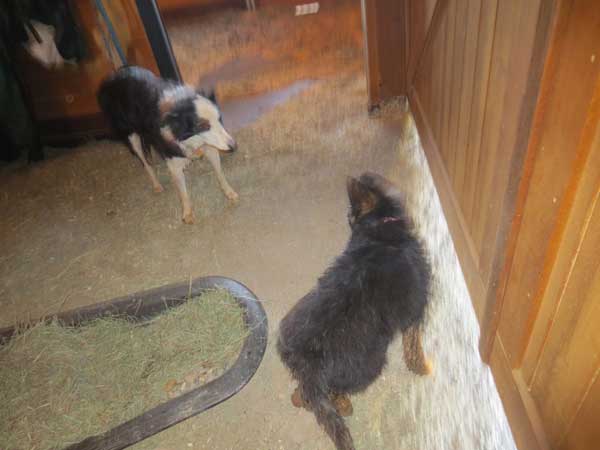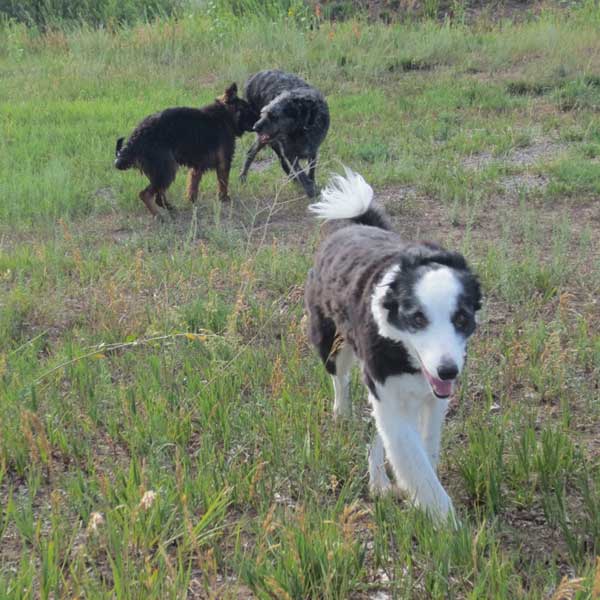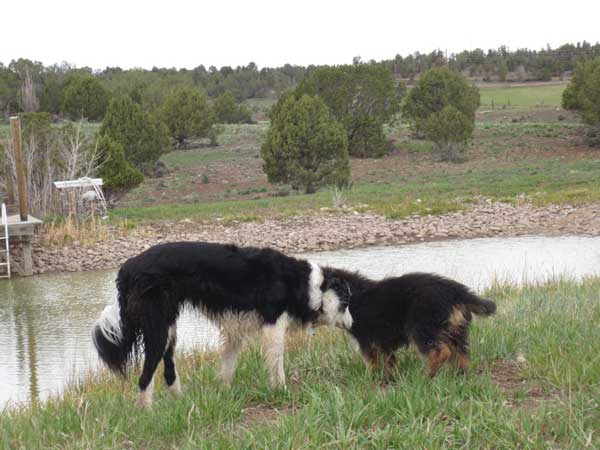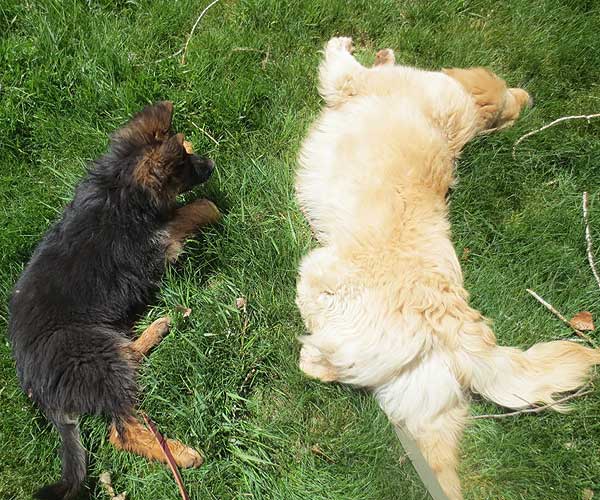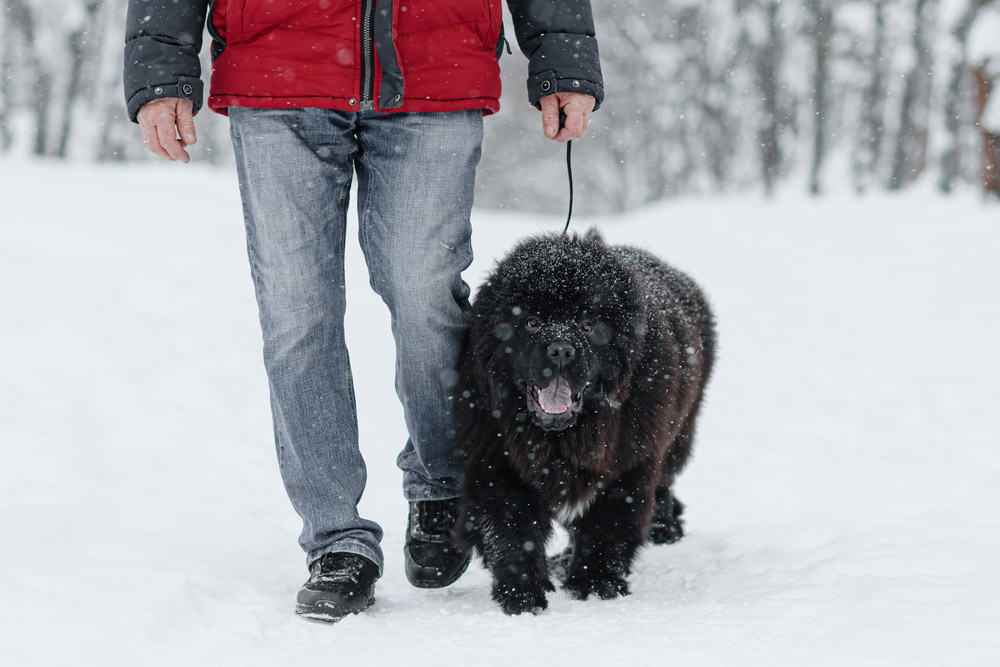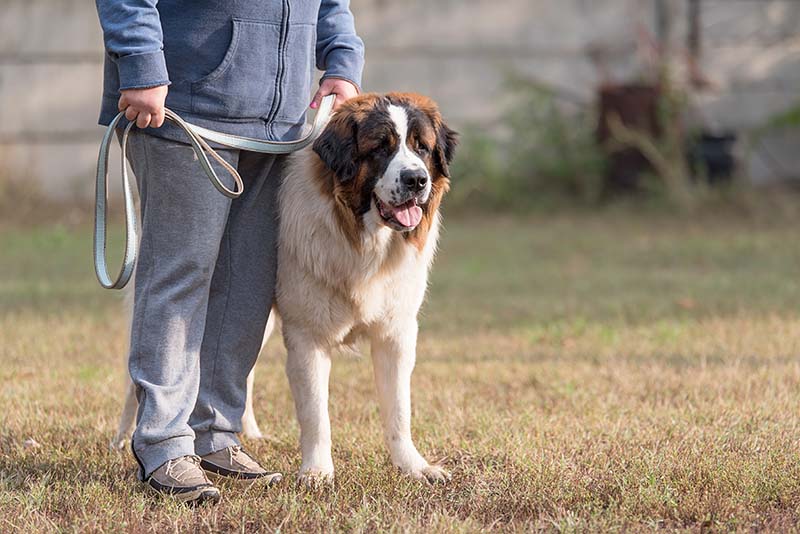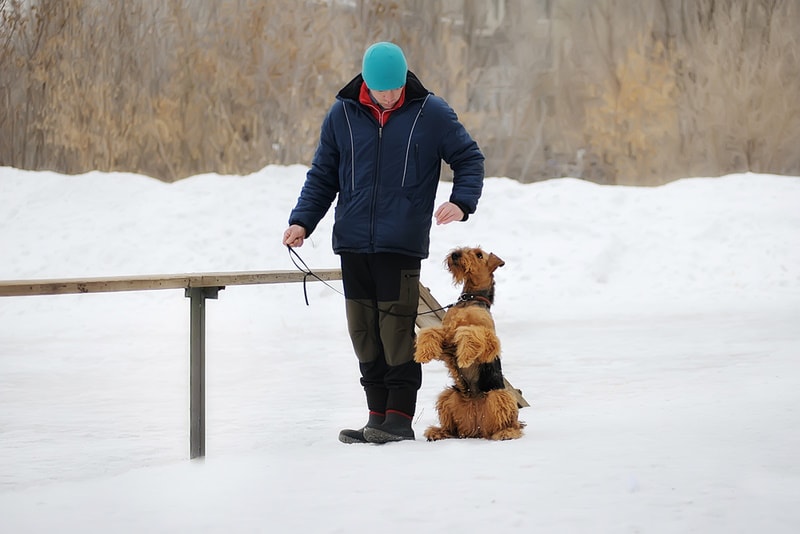I knew what I was doing when I started looking for a German Shepherd puppy. As a trainer and dog foster mom, I know how much work puppies really are. That’s one reason I hemmed and hawed about accepting a gorgeous puppy from a friend when the time came: puppies are a TON of work!
I’d been without a German Shepherd for two years since my last glorious Shiloh Shepherd passed away at age 13, however, and my life had a hole in it without a Shepherd at my side.
I worried, too, about the reception my bossy eight-year-old Top Dog, Echo the Border Collie, would give to any new pup. I don’t suffer human fools kindly, and she doesn’t suffer puppies. Like, at all. I have an animal rule on my farm, and it’s this: All new animals must get along with the existing ones. I felt that with my guidance, I could gently ease Echo into accepting a puppy. I would be wrong about that.
Enter Trinket: A bold, smart, and intense 10-week-old in need of a good home. I had turned down three German Shepherds that owners wanted to rehome before Trinket appeared on the scene. I could not say no to her -– she had the background and breeding I wanted, and for once I would be getting a dog whose formative first few weeks were calm and helpful to her. My other four dogs were all rescues, and they all had rough beginnings.
I planned well for her arrival, assuring myself that my knowledge of canine behavior would give me all the resources I would need to help my existing four dogs accept our new puppy.
Ah, the things we tell ourselves we can handle just because we want something.
I drove 1,600 miles in two days to pick up Trinket. I brought Echo with me as well as a large travel crate to give Echo space in the back of the car for the long ride home.
From the first meeting, Echo hated Trinket. Like, really hated her. Echo snarled and stared her down through the crate. Trinket the optimist wiggled and wagged and whined, but to no avail. You know how you meet someone and hate them on the spot? That’s what happened to Echo and Trinket.
Actually, the hate was one-sided –- all coming from Echo. I asked her to “leave it” so she grumpily stood up in the back of the car and turned her back to this rude intrusion and lay down hard with a thud that said to Trinket, “This is not happening. This is not happening. YOU do not exist.”
I knew I had work to do when we got home. I’d placed baby gates in the house to keep a barrier between these two dogs. I’d purchased great chew toys not only for Trinket and her busybody mouth, but for the other four dogs as well.
My pack enjoyed many new treats because I wanted them to associate treats with Trinket. They got the treats only when Trinket was in the room with them. Echo would have foregone every single treat had I been able to ask her which she preferred: Trinket and new treats, or no treats and no Trinket?
On our off-leash, group walks, Trinket managed well enough with the other three dogs. She zeroed in on Echo like a laser, however. Trinket didn’t want to fight with the grouchy Border Collie –- she wanted Echo to be her friend, but Echo firmly said NO, again and again and again, as this video demonstrates:
If Echo had really corrected Trinket in a way that didn’t hurt the puppy but told her she meant it, Trinket would more than likely have steered clear of Echo, the way she did Echo’s brother, Radar. Echo was, in truth, a very gentle dog with excellent bite inhibition, and she was unwilling to REALLY make it clear to Trinket that she has a big personal space around her, which no thinking dog shall cross.
Trinket learned body language from other dogs –- including all the dogs she was meeting at canine socialization every week –- but she would not let go of the idea of turning Echo into her play buddy. No matter how many times Trinket did the right canine thing –- such as throwing herself on her back in front of Echo or licking Echo’s lips -– Echo said NO.
Time for an intervention: for me, not the dogs. I called a dog trainer friend, whining about how hard all of this was. I shared with her that maybe my home was not the very best home for Trinket because of Echo. Echo had begun to sulk and pout around the house, doing that thing where she lies down hard with a thud and turning her back to even me, something she had never done before.
Echo’s broken heart was beginning to break my own. I had to step up training for all or really start to look for a better home for my beloved little Trinket. My wise friend listened patiently and added some additional ideas to help me help my dogs, including adding herbal essences (they helped!).
Here are some steps I implemented:
1. Trinket is on a leash in the house so that she cannot rush into Echo’s space
Echo knows a “back up” command, so when Echo comes close to me and the whirling dervish at the end of my leash, I tell Echo to back up. The distance between the two dogs gives them time to regroup and calm down. In a few minutes, Trinket lays down about three feet from Echo, at which time I heap praise and cooked chicken on them while still keeping them apart. It’s a meat celebration!
2. I tell Echo to “leave it” at any sign of a growl or snarl
I had let her do this in the past, hoping that Trinket would get the message, but Trinket never did. When the growling stops, I praise, praise, praise and more chicken falls from the sky.
3. Trinket has a very good “sit” command
If she controls her emotions for just a quick sit near Echo, I reinforce that. If she is sitting, she is not also in Echo’s face. Progress has been made! Now steak also falls from the sky.
4. I divide up the day — and the dogs
In the mornings, Echo is in my office with me and Trinket is out of sight in another room. I switch that in the evenings. Each dog gets quality one-on-one time with me and away from each other.
5. If Trinket fawns over Echo, she gets a time-out
But it’s a very, very quick time out behind the nearest door. I mean quick -– as in three to four seconds. If Echo snarls, she gets the same quick time out. Then I put them back together and praise and have a meat parade for good behavior.
6. I separate the Trinket and Echo with a strong baby gate
Trinket stays calm with that separation, and so does Echo. I walk over to Trinket and pet her. I call Echo to come closer and pet her sitting next to Trinket but with the gate between them. They each get yummy treats for sitting still next to one another. They only get these high-value treats in close proximity to one another.
It’s been a lot of work –- I won’t lie. It’s also been fascinating to watch both dogs give in a little here and a little more there. I haven’t let Trinket ruin Echo’s quality of life, and Trinket is learning good canine-to-canine skills, which will serve her for the rest of her life. And I got what I wanted, which was to add a German Shepherd to our home, even if at first not all of the residents were thrilled about it. We are working day by day to get back to a place of balance, and, one day, maybe a thrill shared among all the dogs.
About Annie Phenix: Positive-reinforcement dog trainer and author Annie Phenix never met a mountain she did not love, which explains why she lives in Durango, Colorado, and why she is always smiling since she is surrounded by mountains. She delights in the snowy season here, as do her five dogs, two horses, and six adorably cute donkeys.
Read more by Annie Phenix and on dog introductions:
- How to Introduce Your New Dog to Your Resident Dog
- Why I Love Border Collies
- I Hated Summer, Then I Moved to Colorado with My Dogs
- Why I’m a Dog Trainer
- Is Your Dog an Extrovert or an Introvert?
- What Loving My Dogs Taught Me About Empathy
- You’d Think a Trainer Would Have Perfect Dogs, Right? Hah!
Contents
- 1. Trinket is on a leash in the house so that she cannot rush into Echo’s space
- 2. I tell Echo to “leave it” at any sign of a growl or snarl
- 3. Trinket has a very good “sit” command
- 4. I divide up the day — and the dogs
- 5. If Trinket fawns over Echo, she gets a time-out
- 6. I separate the Trinket and Echo with a strong baby gate

